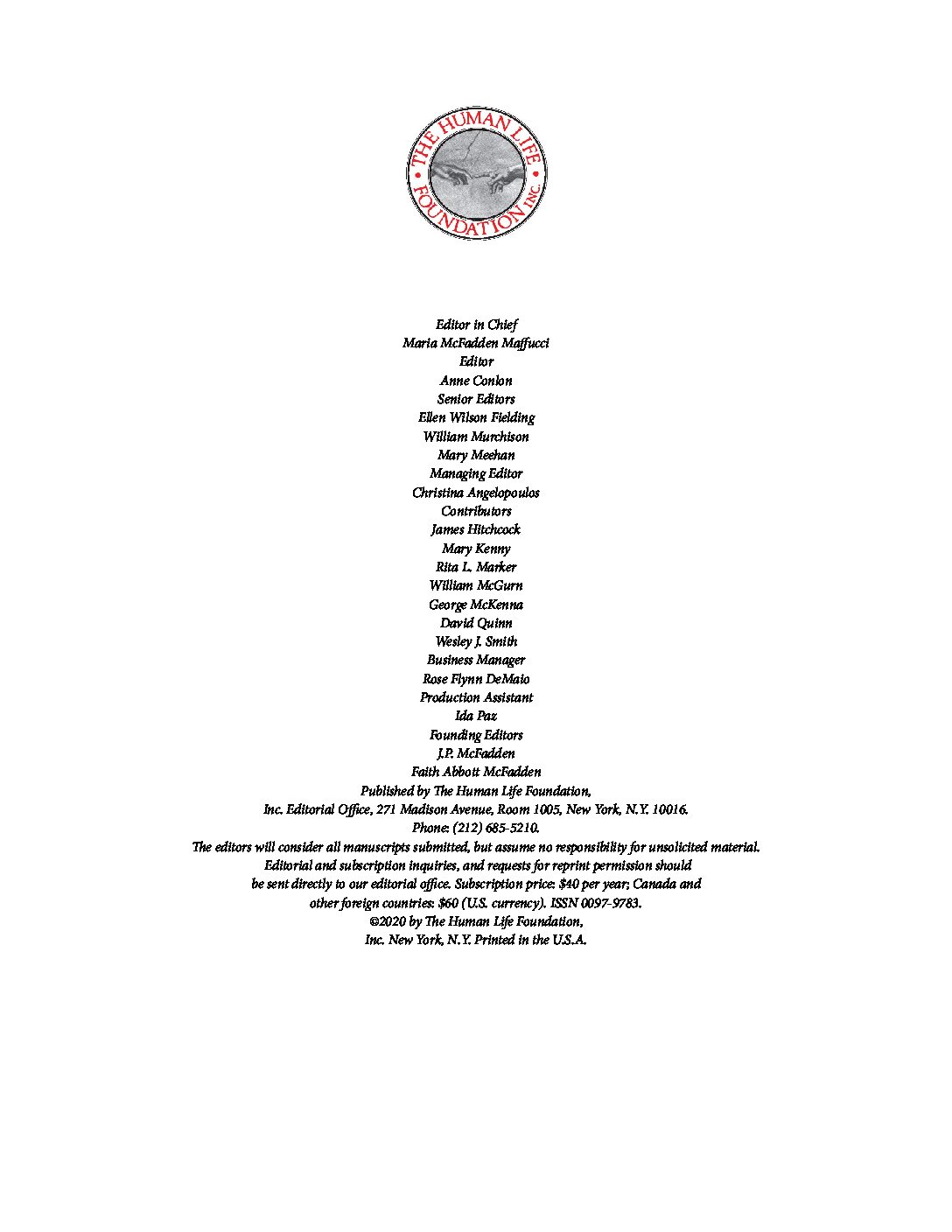
-
About this issue . . .
The issue you hold is the first—and we hope only—of its kind: assembled and edited during a massive international pandemic and quarantine. As you will see, some of the articles were written before the crisis, and some during. I hope and pray that we can soon say “after,” but as we go to press, uncertainty about the future reigns. Issues of life and death are front and center. On the one hand, citizens are staying home, and suffering grave economic consequences, in an effort to protect the vulnerable. On the other hand, while elective surgeries have been put on hold, including needed biopsies and cancer treatments, abortion services in most states have been declared “essential”; abortion mills continue to reap bloody revenue from the bodies of the most vulnerable.
The pro-life movement, already greatly divided over politics and strategy, is showing troubling new fractures, as I describe in Appendix B. And yet we are strong in the powerful convictions we do hold in common, and in our support for the work of pro-life pregnancy centers, which are stepping up their efforts to safely assist clients in a climate of increased pressure to abort.
We welcome two new authors in this issue’s timely and vibrant mix of articles, columns and book reviews. The Honorable Robert G. Marshall served in the Virginia House of delegates for 26 years and wrote that state’s ban on partial-birth abortion. He is co-author, with Charles “Chuck” Donovan of the important book, Blessed are the Barren: the Social Policy of Planned Parenthood, chapter two of which we reprinted in our Winter, 1992 issue. We welcome his original article, “Abortion, Women, and Public Health: Getting the Whole Truth,” on p. 10. Peter Pavia is a writer based in New York City who debuts here with a devastatingly apt review of Abigail Shrier’s book, Irreversible Damage: The Transgender Craze Seducing Our Daughters.
Thanks go to Timothy S. Goeglein and Craig Osten for permission to reprint the chapter “Restoring Medicine and Medical Ethics” from their recently published (by Regnery Gateway) book, American Restoration: How Faith, Family, and Personal Sacrifice Can Heal Our Nation. And where would we be without the relief of laughter, and for that we thank our beloved cartoonist, Nick Downes—his contributions never fail to lift our spirits.
Finally, as you can see from our From the Website collection, our compelling online content has continued uninterrupted during this time of “together, apart,” and we plan to increase our offerings, so please visit www.humanlifereview.com often. And, if you are picking up an issue of the Human Life Review for the first time, welcome, and let us know what you think! We’d love to hear from you. See our inside back cover for contact information.
Maria McFadden Maffucci
Editor in Chief
-
“I write as the coronavirus continues to set back hopes and expectations from throughout the human-relations department of life,” announces senior editor William Murchison at the outset of our lead article. As do I. It is a weird and disorienting time—custom and habit and expectation halted by nationwide governors’ directives to stay home until further notice. “We don’t know all we often think we know,” Murchison observes. “And it shows.” Yes, it does. Millions around the world are “sheltering” from a sudden storm of “unknown unknowns.” We are fortunate here that publishing has long had a foothold in cyberspace, and that our staff, working on laptops in five different households, were able to bring this issue together on deadline.
In “June Medical Services v. Russo: Another Lesson in the Long Reach of Roe,” Murchison uses a recent Supreme Court case to gauge the toll of nearly half a century of abortion jurisprudence on American culture. “The great rethinkings that seem inevitable following the expiration or subsiding of the pestilence and its consequences,” he advises, “really should take into account the greatest oddity I know of in our affairs . . . that we have turned over our moral deliberations to the federal judiciary.” Even if not by design, our jurists now maintain a social stranglehold on the body politic. “Don’t we see? Can’t we see?” Murchison asks. “Our court system isn’t into philosophy. Or morality. Or religion. Or popular consent. We’re into Roe v. Wade.”
Read Full Intro
